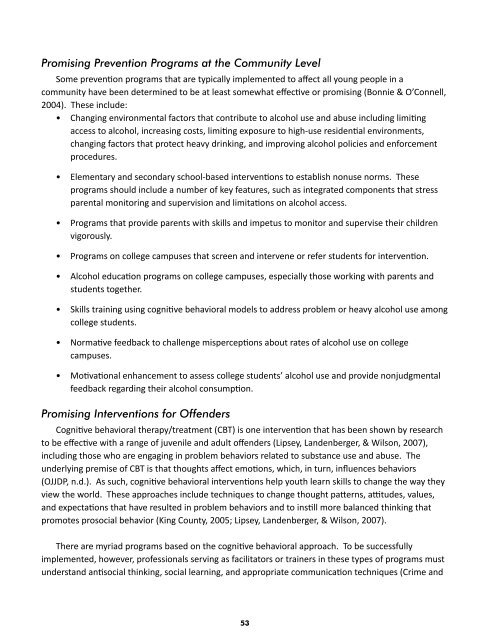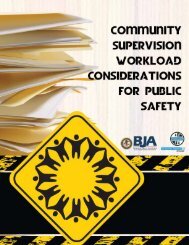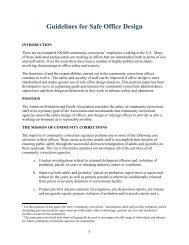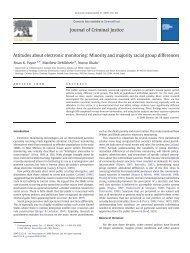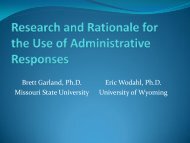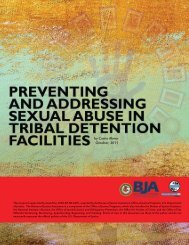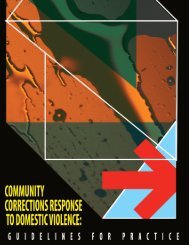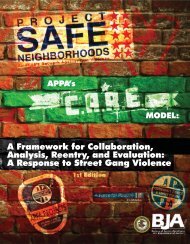Intervention Principles and Practice Guidelines for - Underage ...
Intervention Principles and Practice Guidelines for - Underage ...
Intervention Principles and Practice Guidelines for - Underage ...
You also want an ePaper? Increase the reach of your titles
YUMPU automatically turns print PDFs into web optimized ePapers that Google loves.
Promising Prevention Programs at the Community Level<br />
Some prevention programs that are typically implemented to affect all young people in a<br />
community have been determined to be at least somewhat effective or promising (Bonnie & O’Connell,<br />
2004). These include:<br />
• Changing environmental factors that contribute to alcohol use <strong>and</strong> abuse including limiting<br />
access to alcohol, increasing costs, limiting exposure to high-use residential environments,<br />
changing factors that protect heavy drinking, <strong>and</strong> improving alcohol policies <strong>and</strong> en<strong>for</strong>cement<br />
procedures.<br />
• Elementary <strong>and</strong> secondary school-based interventions to establish nonuse norms. These<br />
programs should include a number of key features, such as integrated components that stress<br />
parental monitoring <strong>and</strong> supervision <strong>and</strong> limitations on alcohol access.<br />
• Programs that provide parents with skills <strong>and</strong> impetus to monitor <strong>and</strong> supervise their children<br />
vigorously.<br />
• Programs on college campuses that screen <strong>and</strong> intervene or refer students <strong>for</strong> intervention.<br />
• Alcohol education programs on college campuses, especially those working with parents <strong>and</strong><br />
students together.<br />
• Skills training using cognitive behavioral models to address problem or heavy alcohol use among<br />
college students.<br />
• Normative feedback to challenge misperceptions about rates of alcohol use on college<br />
campuses.<br />
• Motivational enhancement to assess college students’ alcohol use <strong>and</strong> provide nonjudgmental<br />
feedback regarding their alcohol consumption.<br />
Promising <strong>Intervention</strong>s <strong>for</strong> Offenders<br />
Cognitive behavioral therapy/treatment (CBT) is one intervention that has been shown by research<br />
to be effective with a range of juvenile <strong>and</strong> adult offenders (Lipsey, L<strong>and</strong>enberger, & Wilson, 2007),<br />
including those who are engaging in problem behaviors related to substance use <strong>and</strong> abuse. The<br />
underlying premise of CBT is that thoughts affect emotions, which, in turn, influences behaviors<br />
(OJJDP, n.d.). As such, cognitive behavioral interventions help youth learn skills to change the way they<br />
view the world. These approaches include techniques to change thought patterns, attitudes, values,<br />
<strong>and</strong> expectations that have resulted in problem behaviors <strong>and</strong> to instill more balanced thinking that<br />
promotes prosocial behavior (King County, 2005; Lipsey, L<strong>and</strong>enberger, & Wilson, 2007).<br />
There are myriad programs based on the cognitive behavioral approach. To be successfully<br />
implemented, however, professionals serving as facilitators or trainers in these types of programs must<br />
underst<strong>and</strong> antisocial thinking, social learning, <strong>and</strong> appropriate communication techniques (Crime <strong>and</strong><br />
53


